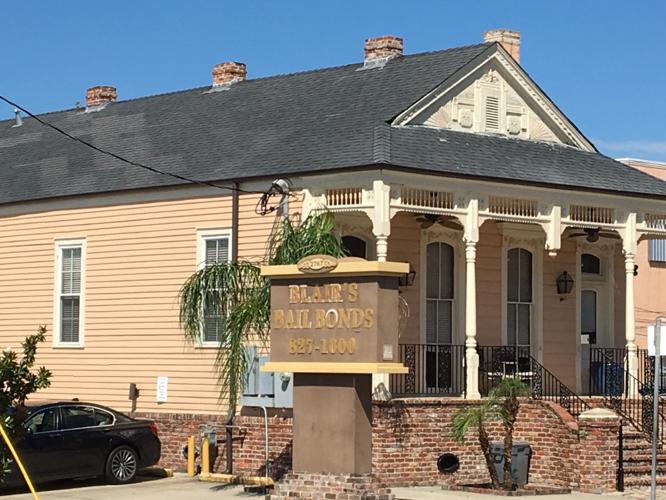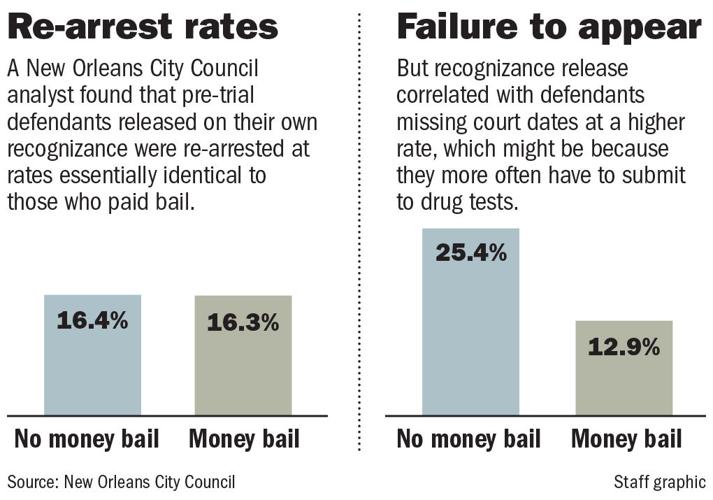For years, jail-reform advocates and bail bondsmen have argued over whether making defendants post bail while awaiting trial keeps New Orleans safer.
On Tuesday, the New Orleans City Council was presented a data analysis saying that defendants released without paying bail are no more likely to be arrested for a new crime.
The analysis also found that jacking up the amount of a cash bail doesn’t seem to correlate with a lower recidivism rate, potentially signaling that judges are correctly assessing defendants' risk to public safety and setting higher bails in response, according to crime analyst Jeff Asher, who conducted the analysis for the council.
In fact, Asher found that people released on bail above $25,000 were actually more likely to be arrested again, 28% of the time, compared to people with bails under $1,000, who were rearrested 9.7% of the time.
"It certainly suggests that the amount of bail does not have a ton of impact on whether or not an individual is going to appear for their court appearances," Asher said.
The findings come at a critical moment for the bail reform debate in New Orleans. Under mayors Mitch Landrieu and LaToya Cantrell, the city has pushed judges at Criminal District Court to release more defendants on their own recognizance without forking over money to a bondsman. The goal was to reduce the city’s jail population.
And earlier this month, civil rights lawyers asked a federal judge for an injunction that would prevent Magistrate Judge Harry Cantrell from requiring any cash bail until the Legislature creates an alternative funding structure for his court. Those lawyers had won a 2017 case against Cantrell, arguing that he had an inherent conflict of interest in setting cash bail when some of those fees supported his court's budget. Cantrell has appealed that decision to the U.S. Supreme Court.
Still, if the advocates win their injunction, New Orleans could immediately see a rapid increase in the number of defendants released on their own recognizance, without any bail.
Whether or not the court agrees to the injunction, the push to release more defendants has already had an effect. According to Asher's report, 8.3% of arrestees were released without putting up cash bail last year, up from 1.9% of arrestees a decade ago.
The analysis, however, was not without some fodder for critics of scaling back the cash bail system. Defendants released without paying bail were twice as likely to skip future court dates than those who posted cash, Asher found.
But he said he suspects there is a simple explanation: When defendants are required to take a regular drug test, which counts as a court date, they have more opportunities to screw up. Defendants released without paying bail are much more often required to submit to testing, Asher found.
The New Orleans City Council on Thursday unanimously approved a zoning change that will allow the Orleans Parish Sheriff’s Office to use a tem…
Overall, reform advocates like Jon Wool, the director of justice policy for the Vera Institute in New Orleans, which backs a simple "release or detain" system where money is not factored into decisions on whether to release arrestees, said Asher's research supports his group's position.
Wool said that Asher’s research “supports what people familiar with experience in our money-based system know: There is no connection between being released with or without having to pay money and the thing we care most about, whether the person will be rearrested during the pretrial period.”
The survey didn’t attempt to determine whether there was a cause-and-effect relationship between money bail and missed court dates or crime.
But a recent study of courts in Philadelphia showed that after a new district attorney there stopped asking for cash bail for many offenses, defendants kept showing up for court at about the same rate as before the policy was enacted. The defendants also weren't more likely to be arrested again, the study found.
Aurélie Ouss, an assistant professor of criminology at the University of Pennsylvania who co-authored the Philadelphia study, said the research attempted to control for factors like increased drug testing that could skew the results.
“We were really able to isolate the effect of financial collateral on compliance,” she said. “We find no effect on compliance when we were able to isolate this single change.”
Criminal justice advocates look at New Orleans’ successful reduction in jail population -- 1,200 inmates now compared to more than 6,000 pre-K…
Reformers also argue that in some cases, pre-trial release conditions like drug testing could do more harm than good by burdening defendants with obligations that don’t actually help them stay sober.
In New Orleans, defendants have to pay $10 for drug tests and sometimes have to wait hours to speak with a judge about the results, Asher said.
Judges are far more likely to order drug tests for defendants released on their own recognizance, Asher found. Thirty-one percent of people released without financial obligations have to take drug tests, compared to only 1.6% of people who pay bail.
One possible explanation is that people accused of felony drug crimes are released without having to pay bail far more often than some other crime categories. Fifty-seven percent of felony narcotics cases resulted in a recognizance release.
Wool argued that Asher’s results should prompt court officials to rethink their drug testing program.
“We have to be more thoughtful if we want to help people meet their pretrial obligations. We should be offering support, not imposing conditions,” Wool said.
However, Rafael Goyeneche, president of the Metropolitan Crime Commission, warned that even if they don’t impose cash bail, judges shouldn’t do away with release conditions entirely. He thinks drug tests may benefit defendants by giving them a reason to stay away from drugs.
“If somebody has a drug addiction and all we’re going to do is release the offender instead of providing them with any services, are we doing justice to the offender? And are we doing justice to the community, if that offender is released?” Goyeneche asked.
Meanwhile, one local bail bondsman urged caution about the larger shift away from cash bail.
New Orleans bail bondsman Blair Boutte’s companies have reached a settlement with civil rights lawyers in a federal lawsuit that accused his b…
Bail bondsmen generally have no objection to releasing people accused of minor, nonviolent crimes on their own recognizance, said Stephen Adams, the owner of #1 Bail Bonds & Recovery and president of the Association of Louisiana Bail Underwriters.
But Adams argued that bondsmen provide a valuable service in rounding up clients who fail to show up in court, and that additional releases could eventually lead to an increase in crime.
“We ensure the court that this defendant is going to come to every appearance,” said Adams. “I make sure she gets back to court at no cost to the taxpayer, at no burden to local law enforcement.”







